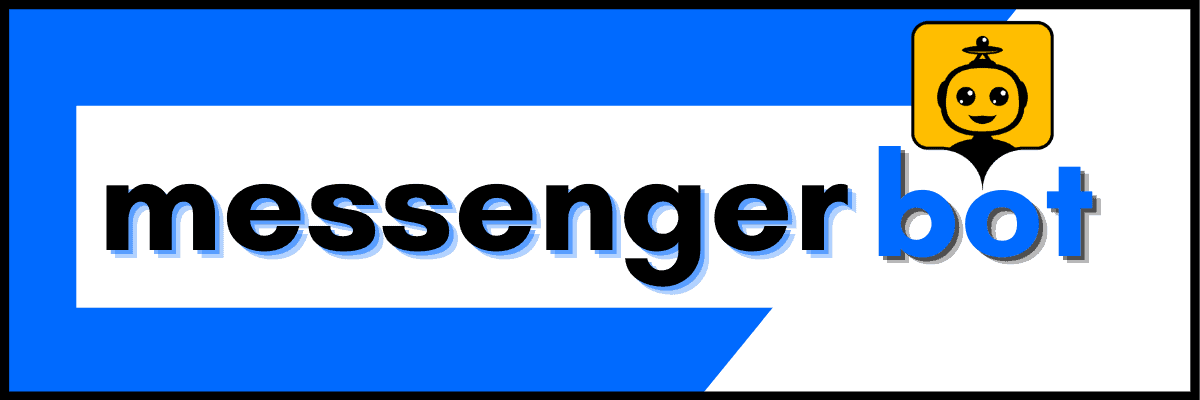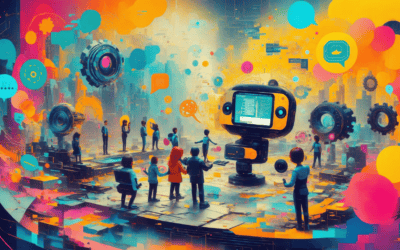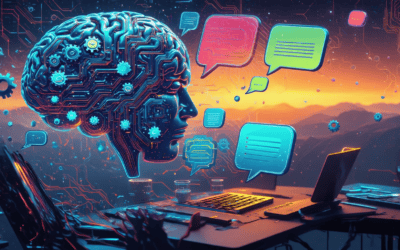In today’s rapidly evolving digital landscape, AI healthcare chatbots are revolutionizing the way patients access medical information and interact with healthcare providers. These innovative tools leverage chatbot technology in healthcare to enhance patient care, streamline communication, and improve overall health outcomes. This article will delve into the transformative role of chatbots in the healthcare industry, exploring key applications and the myriad benefits of chatbots in healthcare. We will answer pressing questions such as, “Is there a medical AI chatbot?” and “Is there a free AI chatbot?” while also examining the future trends of healthcare chatbot projects. Join us as we uncover how these clinical chatbots are not only making healthcare more accessible but also setting new standards for patient interaction and support.
Is there a medical AI chatbot?
Overview of AI Healthcare Chatbots
Yes, there are several medical AI chatbots available, designed to assist with healthcare inquiries and improve patient interactions. One notable example is SmartBot360, which is specifically trained using real patient conversations to enhance its understanding of healthcare-related queries.
Key features of SmartBot360 include:
- Tailored Training: The AI is trained exclusively on healthcare interactions, allowing it to provide accurate and contextually relevant responses to patient questions.
- Three-Tier Architecture: This design minimizes user drop-off rates by ensuring a seamless interaction experience, guiding users through their inquiries effectively.
- Data Source Integration: SmartBot360 references multiple data sources—specifically four distinct sources—to extract pertinent information, ensuring that the responses are not only accurate but also comprehensive.
In addition to SmartBot360, other medical AI chatbots like Ada Health and Buoy Health are also gaining traction. These platforms utilize advanced algorithms and machine learning to assess symptoms and provide personalized health information. For instance, Ada Health employs a symptom assessment tool that helps users understand their health conditions better, while Buoy Health offers a conversational interface that guides users through their symptoms to recommend appropriate actions.
The integration of AI chatbots in healthcare is revolutionizing patient engagement, making healthcare more accessible and efficient. According to a study published in the Journal of Medical Internet Research, AI chatbots can significantly improve patient satisfaction by providing immediate responses and reducing wait times for information (Bickmore et al., 2020).
For more information on the impact of AI in healthcare, you can refer to the following sources: Bickmore, T., et al. (2020). “The Role of Conversational Agents in Health Care: A Systematic Review.” Journal of Medical Internet Research. and “AI in Healthcare: Transforming the Future of Patient Care.” Health IT Analytics.
Evolution of Chatbot Technology in Healthcare
The evolution of chatbot technology in healthcare has been marked by significant advancements in artificial intelligence and machine learning. Initially, chatbots were simple rule-based systems that could handle basic inquiries. However, with the rise of sophisticated AI healthcare chatbots, these systems have transformed into intelligent virtual assistants capable of understanding complex patient needs.
Today, the chatbot technology in healthcare leverages natural language processing (NLP) to interpret user queries more effectively. This has led to the development of various chatbot healthcare use cases, including:
- Symptom Checkers: AI chatbots can analyze symptoms and provide users with potential diagnoses or recommend next steps.
- Appointment Scheduling: Many healthcare providers now use chatbots to streamline the appointment booking process, reducing administrative burdens.
- Patient Education: Chatbots can deliver personalized health information, helping patients understand their conditions and treatment options.
As the chatbots in healthcare industry continue to evolve, we can expect even more innovative applications that enhance patient care and operational efficiency. The future of healthcare is undoubtedly intertwined with the advancements in artificial intelligence healthcare chatbot systems, paving the way for improved patient interactions and outcomes.

What is the Role of AI Chatbots in Healthcare?
AI chatbots play a transformative role in the healthcare sector by enhancing patient engagement, streamlining operations, and improving overall healthcare delivery. Here are several key functions and benefits of AI chatbots in healthcare:
Benefits of Chatbots in Healthcare
1. **Patient Support and FAQs**: Chatbots provide immediate responses to frequently asked questions, helping patients access information about symptoms, medications, and treatment options without the need for human intervention. This reduces the burden on healthcare staff and allows them to focus on more complex patient needs.
2. **Appointment Scheduling**: AI chatbots facilitate the appointment booking process by allowing patients to schedule, reschedule, or cancel appointments through simple conversational interfaces. This can significantly reduce no-show rates and optimize clinic schedules.
3. **Medication Reminders**: Chatbots can send automated reminders to patients about medication schedules, ensuring adherence to prescribed treatments. This feature is particularly beneficial for chronic disease management, where consistent medication intake is crucial.
4. **Symptom Checking**: Many chatbots are equipped with symptom-checking capabilities, guiding patients through a series of questions to assess their conditions and recommend appropriate actions, such as visiting a healthcare provider or seeking emergency care.
5. **Telehealth Integration**: AI chatbots can seamlessly integrate with telehealth platforms, assisting patients in navigating virtual consultations, providing pre-visit instructions, and collecting necessary information before the appointment.
6. **Data Collection and Analysis**: Chatbots can gather valuable patient data, including demographics and health history, which can be analyzed to improve service delivery and patient outcomes. This data can also help healthcare providers identify trends and areas for improvement.
7. **Mental Health Support**: AI chatbots are increasingly being used in mental health care to provide support and resources for individuals experiencing anxiety, depression, or other mental health issues. They can offer coping strategies and direct users to professional help when needed.
8. **Cost Efficiency**: By automating routine tasks and improving operational efficiency, chatbots can significantly reduce operational costs for healthcare facilities, allowing them to allocate resources more effectively.
9. **24/7 Availability**: Unlike traditional healthcare services, chatbots are available around the clock, providing patients with access to information and support at any time, which is particularly beneficial for urgent inquiries.
10. **Personalized Patient Experience**: Advanced AI chatbots can analyze patient data to offer personalized recommendations and health tips, enhancing the overall patient experience and fostering a sense of individualized care.
In conclusion, AI chatbots are revolutionizing the healthcare landscape by improving patient engagement, enhancing operational efficiency, and providing timely support. Their integration into healthcare systems not only streamlines processes but also contributes to better patient outcomes and satisfaction.
For further reading on the impact of AI chatbots in healthcare, refer to sources such as the World Health Organization and the Healthcare IT News.
Use of Chatbots in Healthcare: Key Applications
The applications of chatbots in the healthcare industry are vast and varied, showcasing their versatility and effectiveness. Here are some key use cases:
1. **Chatbots for Hospitals**: Many hospitals are implementing chatbots to assist with patient inquiries, streamline administrative tasks, and enhance the overall patient experience. These chatbots can provide information about hospital services, direct patients to the appropriate departments, and even assist with billing inquiries.
2. **Clinical Chatbots**: Clinical chatbots are designed to support healthcare professionals by providing them with quick access to medical information, treatment guidelines, and patient data. This can enhance decision-making processes and improve the quality of care delivered to patients.
3. **Healthcare Chatbot Projects**: Numerous healthcare organizations are investing in chatbot healthcare projects to improve patient engagement and operational efficiency. These projects often focus on specific areas such as chronic disease management, mental health support, or post-operative care.
4. **Medical Chatbot Apps**: With the rise of mobile health applications, medical chatbot apps are becoming increasingly popular. These apps allow patients to interact with AI chatbots directly from their smartphones, providing a convenient way to access health information and support.
5. **AI Healthcare Chatbot Free Options**: There are various free AI healthcare chatbot options available that allow healthcare providers to test and implement chatbot technology without significant upfront costs. These options can be particularly beneficial for smaller practices looking to enhance their patient engagement strategies.
By leveraging the capabilities of AI chatbots, healthcare providers can improve service delivery, enhance patient satisfaction, and ultimately contribute to better health outcomes. For more insights into chatbot technology in healthcare, explore our features page and consider trying our free trial to experience the benefits firsthand.
Is there a free medical AI?
Yes, there are several free medical AI tools available that can assist users in managing their health. These tools leverage advanced algorithms and extensive medical databases to provide quick and accurate health insights without any cost. One notable option is the Docus AI Symptom Checker, which allows users to input their symptoms and receive potential diagnoses and recommendations. This tool exemplifies the capabilities of an AI healthcare chatbot in delivering reliable information efficiently.
Another prominent free option is the Messenger Bot by HealthTap. This AI-driven chatbot offers personalized health advice and helps users navigate their symptoms effectively. Both Docus AI and HealthTap utilize machine learning to enhance the user experience, making them valuable resources in the realm of chatbots in healthcare industry.
For those seeking comprehensive health assessments, platforms like Ada Health and Symptomate also offer free versions. These applications guide users through a series of questions to evaluate their symptoms and suggest possible conditions, enhancing user understanding of their health. However, it is essential to remember that while these AI tools can provide valuable insights, they should not replace professional medical advice. Always consult with a healthcare provider for accurate diagnosis and treatment options.
Exploring Free AI Healthcare Chatbots
When exploring free AI healthcare chatbots, it’s crucial to consider their functionalities and how they can benefit users. These chatbots often provide a range of services, including:
- Symptom Checking: Tools like Docus AI and Ada Health allow users to input symptoms and receive potential diagnoses.
- Personalized Health Advice: Chatbots like HealthTap offer tailored recommendations based on user input.
- Health Education: Many chatbots provide information on various health conditions, helping users understand their symptoms better.
- 24/7 Availability: Free AI chatbots are accessible at any time, making it easy for users to seek assistance whenever needed.
These features highlight the benefits of chatbots in healthcare, particularly in enhancing patient engagement and providing immediate support.
Best AI Healthcare Chatbot Free Options
In addition to Docus AI and HealthTap, several other free AI healthcare chatbots stand out for their effectiveness:
- Ada Health: This platform guides users through a series of questions to assess their symptoms and suggest possible conditions.
- Symptomate: Similar to Ada, Symptomate offers a symptom checker that helps users understand their health concerns.
- WebMD Symptom Checker: A well-known tool that provides users with potential conditions based on their symptoms.
These options exemplify the chatbot healthcare use cases that are transforming the way individuals interact with health information. By utilizing these free resources, users can gain valuable insights into their health while benefiting from the advancements in chatbot technology in healthcare.
Is there a medical ChatGPT?
Yes, there are medical applications of ChatGPT and similar AI technologies designed specifically for healthcare. These advanced tools leverage artificial intelligence to enhance various aspects of medical practice, providing significant benefits to healthcare professionals and patients alike. Here are some key functionalities and considerations:
- Organizing Medical Notes: Healthcare professionals can utilize ChatGPT to efficiently organize clinical notes and generate structured medical records, enhancing documentation accuracy and saving time.
- Writing Correspondence: ChatGPT can assist clinicians in drafting letters to health insurers, improving communication efficiency and ensuring that necessary information is clearly conveyed.
- Initial Diagnoses: While ChatGPT can aid in generating initial diagnostic suggestions based on patient symptoms, it is crucial to note that it may sometimes recommend treatments that are inappropriate or harmful. Therefore, it should not replace professional medical judgment.
- Research Support: ChatGPT can facilitate clinical and laboratory research by helping to analyze data, summarize findings, and generate hypotheses, thus supporting the research process.
- Specialized Versions: BastionGPT is an example of a private, HIPAA-compliant version of ChatGPT tailored for healthcare professionals. This version is designed to ensure patient confidentiality and data security while providing advanced functionalities such as document uploads, meeting transcriptions, and custom report generation.
- Integration with Messenger Bots: Some healthcare providers are integrating AI chatbots, including Messenger Bots, to enhance patient engagement and streamline communication. These bots can provide patients with information, schedule appointments, and answer common queries, thereby improving overall patient experience.
Comparison of ChatGPT and Other Medical AI Chatbots
When evaluating ChatGPT against other medical AI chatbots, several factors come into play, particularly in the context of chatbot technology in healthcare. Here are some key points of comparison:
- Functionality: While ChatGPT excels in natural language processing and generating human-like responses, other medical chatbots may offer specialized features tailored to specific healthcare needs, such as symptom checking or appointment scheduling.
- Data Security: ChatGPT’s general use may raise concerns regarding patient confidentiality. In contrast, dedicated medical chatbots often incorporate robust security measures to comply with HIPAA regulations, ensuring patient data is protected.
- Integration Capabilities: Many healthcare chatbots are designed to integrate seamlessly with existing healthcare systems, such as electronic health records (EHRs), enhancing their utility in clinical settings.
- Use Cases: ChatGPT can support a wide range of applications, from organizing medical notes to assisting in research. However, other chatbots may focus more on specific chatbot healthcare use cases, such as patient triage or medication reminders.
In conclusion, while ChatGPT offers innovative capabilities for healthcare professionals, it is essential to consider the specific needs of the healthcare environment and the advantages provided by dedicated medical AI chatbots. For further insights into the evolving landscape of AI in healthcare, explore resources from the World Health Organization and Centers for Disease Control and Prevention.

Is There a Free AI Chatbot?
Yes, there are several free AI chatbots available that cater to various needs. These AI healthcare chatbots are designed to enhance user interaction and provide valuable assistance in the healthcare sector. Here’s a comprehensive overview of some of the best options:
- ChatGPT: Developed by OpenAI, ChatGPT is widely regarded as one of the top free AI chatbots. It excels in conversational abilities and can assist with a variety of tasks, including answering questions and providing recommendations.
- Claude: Created by Anthropic, Claude is another highly-rated free AI chatbot. It focuses on user-friendly interactions and is designed to prioritize safety and ethical considerations in its responses.
- Gemini: This AI chatbot from Google is particularly effective for shopping recommendations. It leverages Google’s extensive data to provide personalized product suggestions and comparisons.
- Perplexity: Known for delivering accurate and relevant results, Perplexity is a free AI chatbot that excels in information retrieval and can assist users in finding answers to complex queries.
- Poly.AI: Offering a free, private, and unrestricted chat experience, Poly.AI is designed for users who value confidentiality and want a straightforward conversational interface.
- HIX Chat: This chatbot is tailored for writing assistance, helping users generate blog topics, outline articles, and proofread content effectively.
- Merlin AI: Aimed at enhancing productivity, Merlin AI can assist with drafting email replies and other writing tasks, making it a valuable tool for professionals.
- ProProfs Chat: This platform allows users to create free chatbots for their websites, enabling businesses to engage with customers effectively and provide instant support.
- Zapier: While primarily known for automation, Zapier also offers a chatbot feature that helps create conversational workflows, providing personalized assistance to customers.
- Messenger Bot: Integrated within platforms like Facebook Messenger, this chatbot allows businesses to automate customer interactions, providing quick responses and enhancing user engagement.
These free AI chatbots offer diverse functionalities, making them suitable for various applications, from casual conversations to professional writing assistance. For more detailed information on AI chatbots, you can refer to sources like OpenAI’s official documentation and industry reviews on platforms such as TechCrunch and Wired.
Limitations of Free AI Chatbots in Healthcare
While free AI chatbots present numerous benefits, they also come with certain limitations, particularly in the context of healthcare:
- Limited Functionality: Many free AI healthcare chatbots may not offer the full range of features found in premium versions, which can restrict their effectiveness in complex healthcare scenarios.
- Data Privacy Concerns: Free chatbots may not provide the same level of data security and privacy as paid options, which is crucial when handling sensitive health information.
- Support and Updates: Free versions often lack dedicated customer support and regular updates, which can hinder their performance and reliability in the fast-evolving healthcare landscape.
- Integration Challenges: Some free AI chatbots may not integrate seamlessly with existing healthcare systems, limiting their usability in clinical settings.
Understanding these limitations is essential for healthcare providers considering the use of chatbots in healthcare. For a more robust solution, exploring premium options may be beneficial.
What is the best AI to use for medical questions?
When it comes to addressing medical inquiries, several AI healthcare chatbots stand out for their capabilities and user-friendly interfaces. These tools not only provide answers but also enhance the overall patient experience through efficient communication and support. Here are some of the best medical AI chatbot free resources available in 2024:
Best Medical AI Chatbot Free Resources
- Consensus AI: This specialized AI search engine enables healthcare professionals to efficiently locate and comprehend research papers across diverse medical fields. Consensus AI utilizes natural language processing to summarize findings, making it easier for doctors to stay updated with the latest research.
- Merative (formerly IBM Watson Health): Merative leverages advanced AI algorithms to analyze vast amounts of healthcare data, providing insights that support clinical decision-making. Its capabilities include predictive analytics and personalized treatment recommendations, enhancing patient care.
- Viz.ai: This AI platform focuses on improving patient outcomes by streamlining communication among healthcare teams. Viz.ai uses deep learning to analyze medical imaging and alerts clinicians about critical findings, ensuring timely interventions.
- Regard: Regard is designed to assist clinicians in diagnosing and managing patient care. By integrating with electronic health records (EHR), it provides evidence-based recommendations and reminders, helping to reduce diagnostic errors.
- Twill: Twill offers a conversational AI platform that supports mental health by providing users with personalized resources and guidance. Its chatbot functionality allows for real-time interaction, making mental health support more accessible.
These AI tools represent the forefront of technology in healthcare, each offering unique features that enhance the ability of medical professionals to address complex questions and improve patient outcomes. For further reading on AI in healthcare, refer to sources such as the Journal of Medical Internet Research and the National Institutes of Health.
Evaluating AI Healthcare Chatbot Performance
To ensure that an AI healthcare chatbot meets the needs of both patients and healthcare providers, it’s essential to evaluate its performance based on several criteria:
- Accuracy of Responses: The chatbot should provide reliable and precise information, particularly in medical contexts where misinformation can have serious consequences.
- User Experience: A user-friendly interface and intuitive design are crucial for encouraging engagement and ensuring that users can easily navigate the chatbot.
- Integration Capabilities: The ability to integrate with existing healthcare systems, such as electronic health records (EHR), enhances the chatbot’s utility and effectiveness.
- Data Security: Given the sensitivity of health information, robust security measures must be in place to protect user data.
- Feedback Mechanisms: Incorporating user feedback can help improve the chatbot’s performance over time, ensuring it evolves to meet changing needs.
By focusing on these evaluation criteria, healthcare providers can select the most effective AI healthcare chatbot for their specific needs, ultimately enhancing patient care and operational efficiency.
Chatbots in Healthcare Industry: Future Trends
The future of chatbots in the healthcare industry is poised for significant transformation, driven by advancements in chatbot technology in healthcare and the increasing demand for efficient patient interaction solutions. As we explore the upcoming trends, it’s essential to understand how these innovations will shape the landscape of healthcare delivery.
Healthcare Chatbot Project Innovations
Innovations in healthcare chatbot projects are set to enhance the capabilities of ai healthcare chatbots. These projects are focusing on integrating more sophisticated artificial intelligence algorithms that enable chatbots to provide personalized patient experiences. Key innovations include:
- Natural Language Processing (NLP): Enhanced NLP capabilities allow chatbots to understand and respond to patient inquiries more accurately, improving user satisfaction.
- Predictive Analytics: By analyzing patient data, chatbots can predict health issues and provide proactive recommendations, thus facilitating early intervention.
- Integration with Wearable Devices: Future chatbots will likely connect with wearable health technology, allowing real-time monitoring and personalized health advice.
- Telehealth Integration: Chatbots will increasingly serve as a bridge to telehealth services, enabling seamless transitions from chatbot interactions to virtual consultations.
These innovations not only enhance the benefits of chatbots in healthcare but also position healthcare providers to deliver more efficient and tailored services.
Clinical Chatbots: Transforming Patient Interaction
Clinical chatbots are revolutionizing how patients interact with healthcare systems. By automating routine inquiries and administrative tasks, these chatbots free up valuable time for healthcare professionals, allowing them to focus on more complex patient needs. Key aspects of this transformation include:
- 24/7 Availability: Clinical chatbots provide round-the-clock support, ensuring patients can access information and assistance whenever needed.
- Streamlined Appointment Scheduling: Chatbots can manage appointment bookings and reminders, reducing no-show rates and improving overall clinic efficiency.
- Patient Education: By delivering tailored health information, chatbots empower patients to make informed decisions about their care.
- Data Collection: Chatbots facilitate the collection of patient data, which can be analyzed to improve service delivery and patient outcomes.
As the chatbot in healthcare industry continues to evolve, the integration of these clinical chatbots will play a crucial role in enhancing patient engagement and satisfaction.




